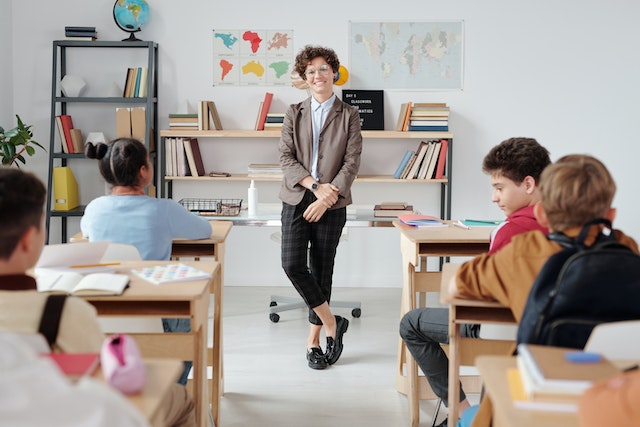Smart Ventilation System Given Passivhaus Certification
SAV Systems' AirMaster AM 1000, a mechanical ventilation unit, has been awarded Passivhaus Component certification. The flagship AM 1000 is the first...
Read Full Article
As autumn term begins for UK school children, indoor air quality in educational facilities is under the spotlight thanks to new survey data.
The Air Quality in UK Classrooms Report, conducted by Airflow, asked teachers at 133 schools across the UK for their insights into working and learning conditions at UK schools.
90 per cent of teachers agree that poor air quality impacts the lung and mental health of their students, and over half said it affects grades and academic performance.
Almost three in four classrooms suffer from air quality that is “below standard”, according to the responses collected. Three-quarters of teachers noticed that substandard air quality caused concentration problems in students, while 53 per cent said performance or grades suffered.
Mrs. X, who works at a London primary school but wishes to remain anonymous said: “Returning to school after the pandemic, all schools were advised to keep windows open to improve air quality. However, in winter, the classrooms would obviously get very cold. Children would be distracted and this impacted learning.
“Even with windows open, pollution around the school area means that air quality is not drastically improved. We know that poor air quality and ventilation lead to higher levels of CO2 in the classroom, which affects cognitive performance (reduces memory, impairs concentration, lowers decision-making abilities) and inhibits learning.
“In addition, children who struggle with self-regulation find it particularly hard to be in poorly-ventilated environments and may demonstrate disruptive behaviour, leading to them being sent out of the classroom, meaning they are not learning from their teacher.
"Some schools I work in have indoor areas which are poorly ventilated without any windows. I've seen examples of children fainting and disengaging due to dehydration in excessively hot and stuffy classrooms."
–Nicola D'Urso
School Speech and Language Therapist
Nicola D'Urso, School Speech and Language Therapist, added: “Some schools I work in have indoor areas which are poorly ventilated without any windows. I've seen examples of children fainting and disengaging due to dehydration in excessively hot and stuffy classrooms.
It's not uncommon for children to become drowsy and even the brightest students can stop interacting in lessons. I notice caring and responsible teachers often having to prioritise children's health and wellbeing during lessons instead of teaching them the educational content.
A Coventry University study saw scientists observing 805 children in 32 naturally ventilated classrooms in UK primary schools during cold and warm seasons. They found that 40 per cent of classrooms failed to provide an adequate ventilation rate.
It was found that a classroom with high potential for natural ventilation does not necessarily provide adequate indoor air quality as that relies on doors and windows being open.
One potential answer is the use of air purification systems, which produce high-intensity UV fields. This disrupts the RNA of bacteria, breaking the strands and stopping them from being able to replicate. 71 per cent of teachers surveyed say they want their school to install air filtration or purification systems.
More than a quarter (27 per cent) of respondents said their school is trying to improve air quality, but cannot due to a lack of funding or government support.
Nicola D'Urso continued: “The main obstacle is that senior leadership teams in schools are at the mercy of their local council's policy on clean air and limiting air pollution. The roadblock for schools is that it's a bit out of their hands given that it's up to the council and the government to get a grasp of air pollution and put adequate policies in place.”
Other desired changes identified by the teachers include replacing old heating appliances, banning cars on streets with schools during school run times and relocating playgrounds and classroom windows away from roads.
You can read the full survey findings here.
Picture: a photograph of a teacher standing at the front of the classroom. Image Credit: Pexels
Article written by Ella Tansley | Published 08 September 2022
SAV Systems' AirMaster AM 1000, a mechanical ventilation unit, has been awarded Passivhaus Component certification. The flagship AM 1000 is the first...
Read Full ArticleA policy paper launched at the Building Engineering Services Association’s World Ventilation Day event suggests there is a “two-year window of...
Read Full ArticleWith hay fever affecting one in four adults, how can workplace managers ensure sufferers are comfortable at work during the hay fever season? Hay fever season usually...
Read Full ArticleAn awareness campaign to promote the critical role of building ventilation has been launched by a coalition of scientists, academics, engineering bodies and environmental...
Read Full ArticleResearch suggests that the global market for commercial building ventilation and indoor air quality is set for huge growth, as businesses demand the creation of...
Read Full ArticleIn terms of virus transmission risk, are there days that are “safer” to attend the workplace than others? According to the Infogrid Air Quality Index, only...
Read Full ArticleBuilding managers and FMs are preparing for changes to Building Regulations regarding ventilation and indoor air quality. According to actionforcleanair.org.uk, poor...
Read Full ArticleA solution to remove COVID-19 from the air using UV sanitisers will soon be used in hospitals, after a team led by engineers from the Institution of Mechanical Engineers...
Read Full ArticleThe advice includes how to ventilate rooms whilst keeping them warm, monitoring indoor air quality, and safely ventilating vehicles. What are the Legal...
Read Full ArticleThe BESA Conference was opened by the association’s president Neil Brackenridge who explained that the overall theme was “Building back better, safer,...
Read Full Article